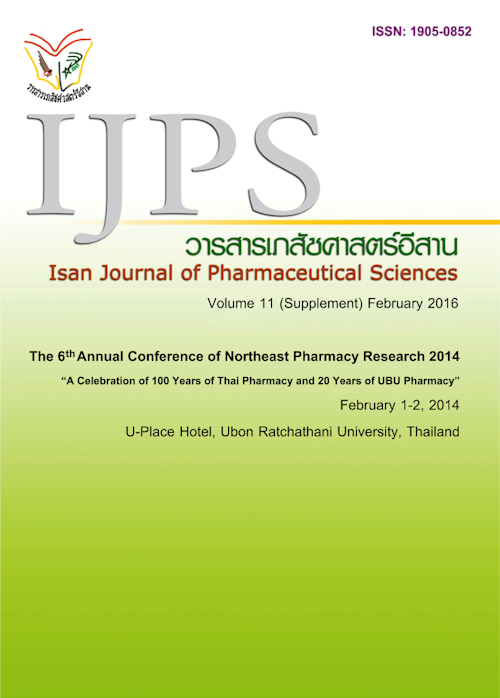Physicochemical Stability of Meloxicam Loaded Vesicle Formulations: Effect of Cholesterol
Main Article Content
Abstract
Introduction: Deformable liposomes (DF) have been developed as transdermal drug delivery because there are several studies focusing on the use of DF for enhancing skin permeation of various drugs. However, DF consisted of phospholipid and edge activator can increase deformability and destabilize lipid bilayer. The edge activator as penetration enhancer might improve the effectiveness of skin permeability. However, it might also increase instability of vesicle formulation. The intensive studies of vesicle systems suggested that cholesterol is a stabilizer for enhancing the stability of vesicle. The physicochemical characteristics and the stability of vesicle formulation might be a primary factor that should be concerned in development of DF. The most effectiveness for skin delivery with instability formulation was not suitable for transdermal delivery carriers. The aim of this study was to investigate the effect of cholesterol on physicochemical characteristics and stability of vesicle formulation for being optimal transdermal delivery carrier for meloxicam. Materials and Method: Four vesicle formulations i.e., conventional liposome (LP), conventional liposome with cholesterol (LP-Chol), deformable liposome (DF) and deformable liposome with cholesterol (DF-Chol) were prepared. The vesicle formulation obtained from optimization using response surface method, consisted of meloxicam (0.07% w/v), phosphatidylcholine (0.77% w/v), hexadecyl pyridinium chloride (0.10% w/v) and cholesterol (0.04% w/v) as a penetration enhancer and membrane stabilizer, respectively. The vesicle size, zeta potential, elasticity, drug content and stability at 4 and 25°C for 120 days of all vesicle formulations were investigated. Results: The addition of cholesterol resulted in significant difference in physicochemical characteristics of meloxicam-loaded vesicle formulation. No sedimentation was found in any formulation at 4 and 25°C for 30 days. After storage at 4°C for 30 days and 25°C for 15 days, the meloxicam remaining in nearly all of the formulations had slightly decreased but still higher than 90% of the initial formulation. The stability of liposome formulation was not significantly different between the experimental temperature of 4 and 25°C for 30 days, but it was significantly different between the storage age of day 1 and day 120. Therefore, the storage age and temperature was the major and minor factor affecting the stability of vesicle formulation. The vesicle formulations were not significantly different between the formulation with and without cholesterol. Conclusion: Our optimal vesicle formulations obtained from response surface method were stable over a period of this study. The recommended storage condition for the vesicle formulation was 4°C for 30 days and/or 25°C for 15 days.
Article Details
In the case that some parts are used by others The author must Confirm that obtaining permission to use some of the original authors. And must attach evidence That the permission has been included


